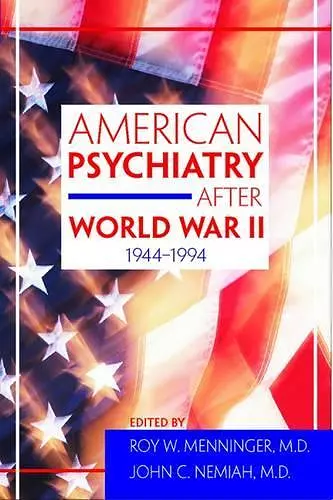American Psychiatry After World War II (1944-1994)
Roy W Menninger editor John C Nemiah editor
Format:Hardback
Publisher:American Psychiatric Association Publishing
Currently unavailable, our supplier has not provided us a restock date

This incisive history of American Psychiatry after WWII offers a healthy corrective to professional arrogance. Colleagues no less able than we suppose ourselves to be, and no less dedicated to patient welfare, recommended treatments and supported policies few would advocate today. If they were misled, may we not be vulnerable as well? Chastened by history, we will be less ready to follow those who proclaim 'breakthroughs' and revolutions in social policy. Modesty becomes us. Leon Eisenberg, M.D., Department of Social Medicine, Harvard Medical School, Boston, Massachusetts
This volume summarizes the significant events and processes of the half-century following World War II. Most of this history is written by clinicians who were central figures in it.
The history of psychiatry is complex, reflecting diverse origins in mythology, cult beliefs, astrology, early medicine, law religion, philosophy, and politics. This complexity has generated considerable debate and an increasing outflow of historical scholarship, ranging from the enthusiastic meliorism of pre-World War II histories, to the iconoclastic revisionism of the 1960s, to more focused studies, such as the history of asylums and the validity and efficacy of Freudian theory. This volume, intended as a successor to the centennial history of American psychiatry published by the American Psychiatric Association in 1944, summarizes the significant events and processes of the half-century following World War II. Most of this history is written by clinicians who were central figures in it.
In broad terms, the history of psychiatry after the war can be viewed as the story of a cycling sequence, shifting from a predominantly biological to a psychodynamic perspective and back again—all presumably en route to an ultimate view that is truly integrated—and interacting all the while with public perceptions, expectations, exasperations, and disappointments.
In six sections, Drs. Roy Menninger and John Nemiah and their colleagues cover both the continuities and the dramatic changes of this period. The first four sections of the book are roughly chronological. The first section focuses on the war and its impact on psychiatry; the second reviews postwar growth of the field (psychoanalysis and psychotherapy, psychiatric education, and psychosomatic medicine); the third recounts the rise of scientific empiricism (biological psychiatry and nosology); and the fourth discusses public attitudes and perceptions of public mental health policy, deinstitutionalization, antipsychiatry, the consumer movement, and managed care. The fifth section examines the development of specialization and differentiation, exemplified by child and adolescent psychiatry, geriatric psychiatry, addiction psychiatry, and forensic psychiatry. The concluding section examines ethics, and women and minorities in psychiatry.
Anyone interested in psychiatry will find this book a fascinating read.
Intended to follow in the footsteps of the centennial history of psychiatry, published in 1944, this book is fittingly edited by Roy Menninger, a scion of a family that made important contributions to the story of psychiatry and Jon Nemiah, a distinguished emeritus editor of the American Journal of Psychiatry, which recorded so much of what is retold here.
* The New England Journal of Medicine *In this book, a monumental achievement, they define the evolution of American psychiatry from [World War II] to 1994. . . . This book will become the definitive classic in the study of American psychiatry.
* READINGS: A Journal of Reviews and Commentary of Mental Health *For its comprehensive, balanced coverage, the volume is something of a tour de force, certainly an essential manual for any student of the history of American Psychiatry.
* Canadian Bulletin of Medical HistoISBN: 9780880488662
Dimensions: 254mm x 178mm x 38mm
Weight: 1352g
680 pages